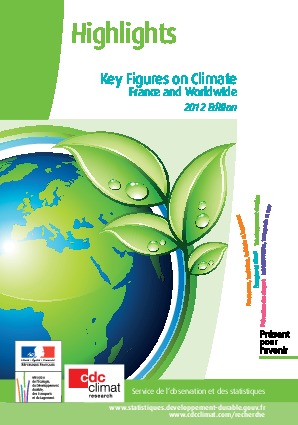Highlights – Key Figures on Climate France and Worldwide 2013 Edition
By Frédéric OURADOU, Florine WONG, Daniel DELALANDE and Romain Morel
The 2013 edition of “Key Figures on Climate” has been prepared within the context of the 18th Conference of the Parties on Climate Change (COP18) held in Doha from 26 November to 7 December 2012.
This latest version has been slightly revised from the 2012 edition. The layout of certain parts has been changed and some new indicators have replaced less relevant ones. This publication, through its organization and the choice of covered topics, aims to inform the widest audience possible about climate change, its mechanisms, causes and effects as well as international mechanisms established to limit it.
The panorama compiled in the five parts of this document is sometimes based on several sources, some of which are now relatively old but authoritative (e.g. IPCC 2007), and whose perimeters may vary according to the nature, origin and availability of information collected.
